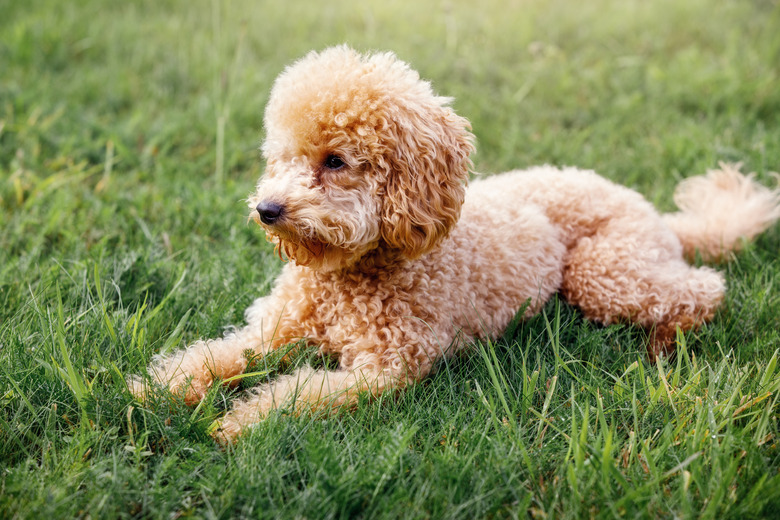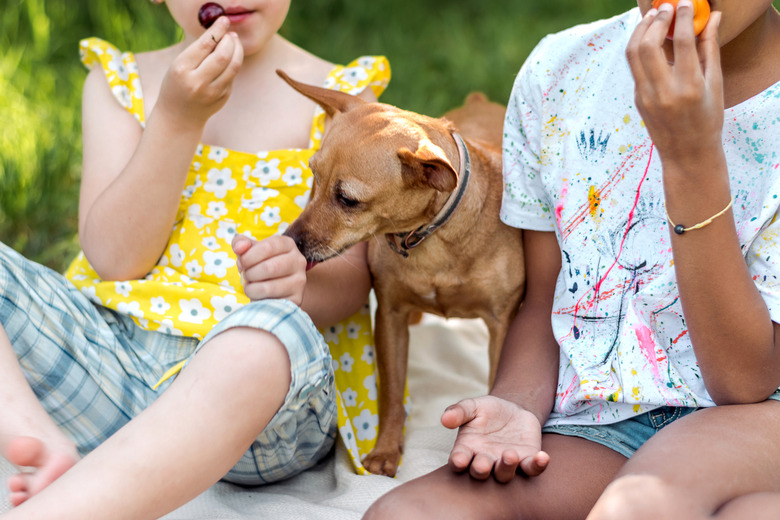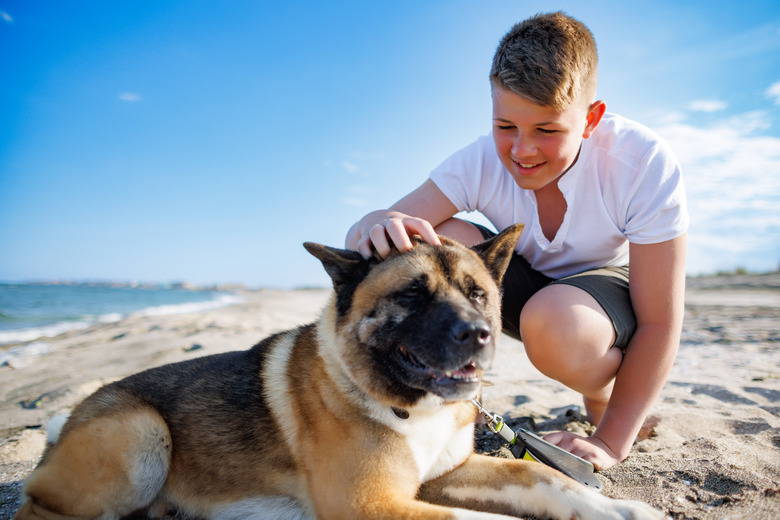Thickened Stomach Lining In Dogs
A thickening of the stomach wall in dogs is usually caused by a bout of gastritis or pyloric obstruction, also referred to as stenosis. Stomach tumors and cancer may also cause a thickening of the stomach wall. A vet will rely on blood work, imaging and biopsies to determine the cause of a thickened stomach wall. Below are some conditions which can result in thickening of the gastric wall in dogs.
Gastritis stomach irritation in dogs
Gastritis stomach irritation in dogs
Gastritis, or an inflammation of the stomach, is typically triggered when something ingested irritates or injures a dog's stomach lining. You may not realize your dog snagged something he shouldn't have until he throws up the evidence. Other signs of gastritis include diarrhea and a dog assuming a position with his rear up and his chest and front legs on or near the floor, signaling that he has abdominal pain.
A dog suffering from a bout of short-term gastritis usually recovers fairly easily. Although withholding food for 12 to 24 hours was once recommended, this is no longer advised, Instead, feed your dog a bland diet of skinless white meat chicken or boiled hamburger mixed with rice, pasta, or potato. This will fill him up and soothe his stomach for a day until his stomach is fully recovered.
Treatment for chronic gastritis in dogs
Treatment for chronic gastritis in dogs
When gastritis persists beyond a week or two, it's considered chronic gastritis. The stomach's lining may be irritated, causing thickening of the stomach wall, from foreign bodies, drugs, chemical irritants or infectious agents, although immune-related disease and long-term allergen exposure may also cause the problem.
Weight loss, black, tarry feces, and diarrhea are symptoms, along with vomiting. When the dog throws up, his vomit may contain undigested food, blood spots, dark red specks of digested blood, and yellow (possibly green) bile from his gallbladder.
Chronic gastritis requires veterinary attention. The vet will order lab work to include a blood chemical profile, complete blood count, and urinalysis. Radiographs, ultrasound, and a biopsy may also be necessary. Unless he's severely dehydrated and requires fluid therapy, your dog will likely be able to recuperate at home with diet and medication. Ultimate treatment depends on the underlying cause, but the dog will likely recuperate from his spell with a bland diet while the vet develops an underlying diagnosis.
Pyloric obstruction and stomach thickening in dogs
Pyloric obstruction and stomach thickening in dogs
The lower portion of your dog's stomach is known as the pylorus. When the different layers of the lower portion of a dog's stomach lining thicken, they're suffering from pyloric obstruction. As the lining thickens, food and water aren't able to flow through the stomach properly, making a dog vomit or regurgitate. Other gastric wall thickening symptoms related to pyloric obstruction include dehydration and depression.
As the condition progresses, the dog will experience chronic vomiting, which can cause weight loss, metabolic problems and aspiration pneumonia, a potentially fatal combination. Young, male brachycephalic breed dogs, such as boxers and bulldogs, are prone to stenosis, as are older small dogs, such as the shih tzu, Lhasa apso and Maltese.
Diagnosing and treating pyloric obstruction
Diagnosing and treating pyloric obstruction
Though symptoms, medical history, and a physical exam contribute to a diagnosis, the vet will likely rely on a gastroscopy to confirm pyloric obstruction. A gastroscopy uses an endoscope in the stomach to give a visual confirmation and a biopsy of the pylorus may be taken at the time of the procedure for additional confirmation.
Medical management, such as antacids, antibiotics, and intravenous fluids help the condition; however, surgery may cure the condition. There are different types of surgery at the surgeon's disposal; the ultimate choice depends on which tissue is affected and the surgeon's experience with the condition. The goal remains the same: restoring the size of the opening from the pylorus to the beginning of the small intestine to its normal size.
Intestinal leiomyoma and thickening in the stomach
Intestinal leiomyoma and thickening in the stomach
A thickened stomach lining is also a symptom of intestinal leiomyoma. A leiomyoma is a tumor in the stomach and intestinal tract. A benign tumor, its main complication is its potential to block the flow of fluid and food through the digestive system. When confined to the stomach, vomiting is usually the only symptom. The vet will rely on blood work, ultrasound, and endoscopy for diagnosis and successful treatment requires surgical removal.
Cancerous causes of stomach thickening
Cancerous causes of stomach thickening
Other potential causes of a thickened stomach wall include granuloma, lymphoma and carcinoma. Ultrasonography is helpful when the vet is determining what type of cancer is present in the stomach.
Studying where and how widespread the stomach thickening is provides clues about the type of cancer present. For example, granulomas and tumors often produce asymmetrical thickening while thickening associated with lymphoma tends to be spread across the stomach wall.


